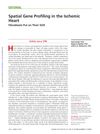November 2022 in “Regenerative Therapy” Advancements in tissue engineering show promise for hair follicle regeneration to treat hair loss.
October 2022 in “Experimental Dermatology” New technologies show promise for better hair regeneration and treatments.
[object Object]  October 2021 in “QJM: An International Journal of Medicine”
October 2021 in “QJM: An International Journal of Medicine” Intense Pulsed Light treatments significantly improve signs of aging and sun damage on the skin.
September 2021 in “CRC Press eBooks” Dissecting cellulitis of the scalp is a condition that causes inflammation and scarring on the scalp, mainly affecting African-American men, and can lead to permanent hair loss.

The new sensor can detect a toxic chemical in water with high sensitivity and accuracy.
 September 2014 in “Proceedings of SPIE, the International Society for Optical Engineering/Proceedings of SPIE”
September 2014 in “Proceedings of SPIE, the International Society for Optical Engineering/Proceedings of SPIE” OCT can effectively examine and reveal details about human hair and scalp conditions.
 December 2024 in “Medical Review”
December 2024 in “Medical Review” Organoids help study and treat genetic diseases, offering personalized medicine and therapy testing.
 153 citations,
November 2004 in “Current Medicinal Chemistry”
153 citations,
November 2004 in “Current Medicinal Chemistry” The document concludes that Catalyst software is effective for drug design, identifying potent compounds for various medical conditions.
 3 citations,
February 2021 in “bioRxiv (Cold Spring Harbor Laboratory)”
3 citations,
February 2021 in “bioRxiv (Cold Spring Harbor Laboratory)” Adult esophageal cells can start to become like skin cells, with a key pathway influencing this change.
164 citations,
February 2010 in “Journal of Cell Science” Human dermal stem cells can become functional skin pigment cells.
 6 citations,
October 2018 in “Bioelectromagnetics”
6 citations,
October 2018 in “Bioelectromagnetics” Rice bran extract and low-frequency electromagnetic fields together may help treat vitiligo and white hair.
 2 citations,
December 2022 in “Journal of Biochemistry and Molecular Biology”
2 citations,
December 2022 in “Journal of Biochemistry and Molecular Biology” Organoids created from stem cells are used to model diseases, test drugs, and develop personalized and regenerative medicine.
 47 citations,
November 2021 in “Advanced Functional Materials”
47 citations,
November 2021 in “Advanced Functional Materials” The new hydrogel dressing with natural molecules helps heal wounds faster and improves skin repair.
 36 citations,
February 2018 in “British Journal of Dermatology”
36 citations,
February 2018 in “British Journal of Dermatology” Sweat glands and hair follicles are structurally connected within a specific layer of skin fat.
 13 citations,
November 2022 in “Chemical Science”
13 citations,
November 2022 in “Chemical Science” Inorganic-based biomaterials can quickly stop bleeding and help wounds heal, but they may cause issues like sharp ion release and pH changes.
10 citations,
November 2017 in “Letters in drug design & discovery” Researchers identified promising inhibitors for the BRD4 protein, including finasteride and amentoflavone.
 9 citations,
August 2018 in “Biomedical dermatology”
9 citations,
August 2018 in “Biomedical dermatology” A peptide called DPS-1 helps human scalp cells grow and stimulates hair growth in mice.
 3 citations,
December 2020 in “Medical Journal of Cell Biology”
3 citations,
December 2020 in “Medical Journal of Cell Biology” Stem cell technologies are mostly effective in treating diseases and repairing tissues.
3 citations,
January 2017 in “Methods in molecular biology” The book explains how to grow and repair organs using new lab techniques.
 1 citations,
October 2017 in “Circulation”
1 citations,
October 2017 in “Circulation” A new technology showed that the SOX9 gene might control heart scar formation after injury, suggesting new treatment possibilities.
 May 2024 in “Journal of molecular structure”
May 2024 in “Journal of molecular structure” A new compound, 3a, effectively fights prostate cancer better than finasteride.

The document concludes that the new model realistically simulates male baldness and could be useful for medical purposes and entertainment.
January 2019 in “프로그램북(구 초록집)” Silibinin may help hair growth and treat hair loss.
 September 2017 in “Journal of Investigative Dermatology”
September 2017 in “Journal of Investigative Dermatology” Aging causes sweat glands to shrink, leading to skin issues, and blue light can help hair grow.
The arrector pili muscle plays a key role in hair loss in androgenetic alopecia.
[object Object]  160 citations,
April 2012 in “Journal of Cellular and Molecular Medicine”
160 citations,
April 2012 in “Journal of Cellular and Molecular Medicine” Telocytes might help with skin repair and regeneration.
 69 citations,
January 2013 in “Frontiers in Immunology”
69 citations,
January 2013 in “Frontiers in Immunology” The FOXN1 gene is crucial for developing immune cells and preventing immune disorders.
 40 citations,
June 2013 in “Molecular Pharmaceutics”
40 citations,
June 2013 in “Molecular Pharmaceutics” The gelatin/β-TCP scaffold with nanoparticles improves wound healing and skin regeneration.
 33 citations,
August 2015 in “F1000Research”
33 citations,
August 2015 in “F1000Research” New model shows muscle affects hair loss differently in men and women.
 27 citations,
August 2014 in “Wiley interdisciplinary reviews. Developmental biology”
27 citations,
August 2014 in “Wiley interdisciplinary reviews. Developmental biology” The skin and thymus develop similarly to protect and support immunity.





















